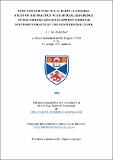Files in this item
Text and sub-text in T.S. Eliot : a general study of his practice with special reference to the origins and development through successive drafts of 'The confidential clerk'
Item metadata
| dc.contributor.advisor | Ashe, A. H. | |
| dc.contributor.advisor | Bayley, Peter | |
| dc.contributor.author | Barr, A. F. M. Abdul | |
| dc.coverage.spatial | vii, 380 p. | en_US |
| dc.date.accessioned | 2018-07-09T15:00:19Z | |
| dc.date.available | 2018-07-09T15:00:19Z | |
| dc.date.issued | 1985-07 | |
| dc.identifier.uri | https://hdl.handle.net/10023/15142 | |
| dc.description.abstract | This thesis explores Eliot's allusive method, that is his use of Judaeo-Christianity with its analogues (and sometimes sources) in pre-Biblical primitive myths and legends. The first chapters study The Confidential Clerk and the draft material of the play which contains overt allusions-subsequently expurgated - to Sargon and Dionysos'as pre-Biblical archetypes of Moses and Christ respectively. I discuss the growth and development of the two legends of Sargon and Dionysos and their Biblical counterparts through successive drafts of the' play. In adapting the Sargon-Moses legend, Eliot was influenced by Sigmund Freud and Sir James George Frazer who both believed that the legend of Moses's birth and early life closely resembles that of his Babylonian predecessor, Sargon of Accad, which the Hebrews imitated. In adapting, on another level of the play, the Dionysos-Christ legend, Eliot was in debt of Frazer and. John M. Robertson who have persuasively shorn the shaping influence of Dionysos and the Dionysos religion upon the Founder of Christianity and the Christian system. I have used the same approach in studying the other plays of Eliot, The same pattern,ie.,the adaptation of a pre-Biblical legend which has its counterpart in the Bible is to be found in The Family Reunion in which Eliot drew upon the Babylonian epic of Gilgamesh from which he adapted the pre- Biblical legend of the Fall and the deluge story. For the minutiae of these legends in the epic of Gilgamesh and their Old Testament parallels Eliot is indebted to Alfred Loisy, the French Modernist theologian who explains the Genesis in terms of Babylonian mythology. In writing. The Cocktail Party, Eliot went to The Golden Ass of Apuleius, an anti- Christian work, from which he transformed the pre-Biblical legend of Isis, the forerunner of the Virgin Mary, as well as other motifs. Finally The Elder Statesman, Eliot's last play, adapts the pre-Biblical legend of Ahriman, an archetype of the Biblical story of Satan and the concept of evil in the Old Testament. But I have not included this play in my thesis, although I have investigated it, because of limitations of length, and also because the connection of text and sub-text in The Elder Statesman is less significant than that in the other plays. | en_US |
| dc.language.iso | en | en_US |
| dc.publisher | University of St Andrews | |
| dc.subject.lcc | PR6009.L6Z5B2 | |
| dc.subject.lcsh | Eliot, T. S. (Thomas Stearns), 1888-1965--Criticism and interpretation | en |
| dc.title | Text and sub-text in T.S. Eliot : a general study of his practice with special reference to the origins and development through successive drafts of 'The confidential clerk' | en_US |
| dc.type | Thesis | en_US |
| dc.type.qualificationlevel | Doctoral | en_US |
| dc.type.qualificationname | PhD Doctor of Philosophy | en_US |
| dc.publisher.institution | The University of St Andrews | en_US |
This item appears in the following Collection(s)
Items in the St Andrews Research Repository are protected by copyright, with all rights reserved, unless otherwise indicated.

